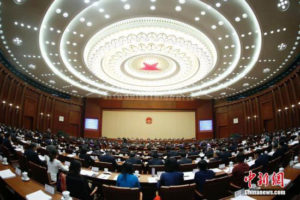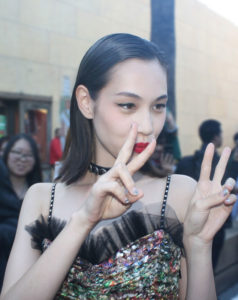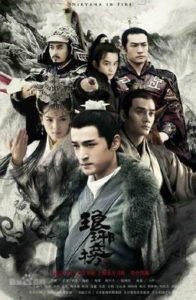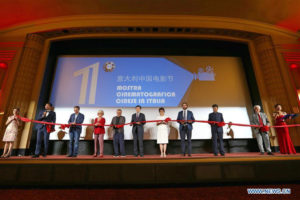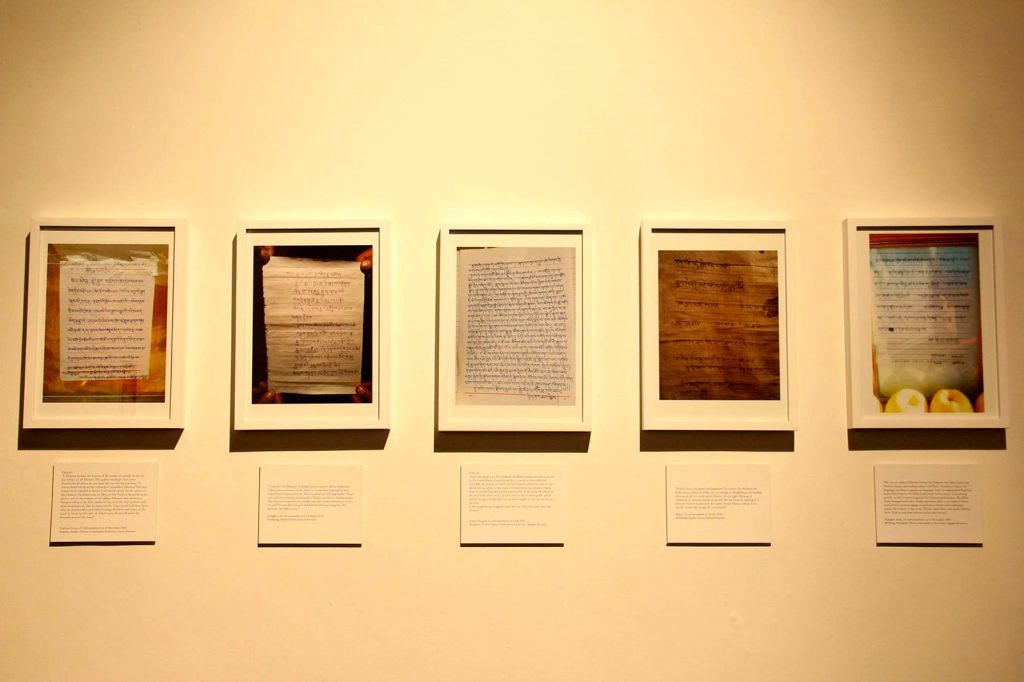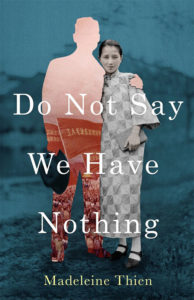Fifty years ago, Mao launched the decade-long, ultra-violent Great Proletarian Cultural Revolution 无产阶级文化大革命. (See Forum ‘Dreaded Anniversaries: The Cultural Revolution and Mao Zedong’) The Cultural Revolution gave extreme expression to his view, first articulated in Yan’an in 1942, that the arts must take ideological direction from the Party and that artists must devote themselves to advancing its policies.
More than any post-Mao leader before him, Xi Jinping has modelled his cultural policies on those of Mao, from the clampdown on the expression of dissent and on ‘Western values’ in the classroom to his insistence that filmmakers and others spend a month each year in the countryside, at mines, or in other impoverished areas.
Yet ever since Deng Xiaoping introduced market-based reforms, beginning in the 1980s and accelerating in the 1990s, the Party has been slashing the subsidies that once made every theatre and film studio a state enterprise and every artist and writer a state employee. The introduction of market forces into the cultural economy had the unintended effect of limiting the Party’s ability to force art to serve as a conduit for propaganda. It also enabled the growth of independent theatre, and commercial and artistic filmmaking, as well as the contemporary art scene. This hasn’t ended the Party’s attempts to control the direction of culture, including through censorship, but it has limited its efficacy. Over the years, a de facto compromise was reached: the Party implicitly acknowledged that not all artistic practice had to serve ideology, while those working in the arts understood that they were not to directly challenge it either. But Xi appears determined to put the arts under control once more.

Mao Zedong (sixth from right in the first row) at the Yan’an Forum on Literature and Art
Source: Wikipedia
In November 2016, the National People’s Congress passed a new law to regulate China’s film industry. The Film Industry Promotion Law 电影产业促进法 is China’s first ‘film law’, and it proscribes the fraudulent reporting of box office takings and other cons particular to the industry, and introduces measures to improve the access of the rural population to film. But it also demands that filmmakers ‘serve the people and serve socialism’, and pledges government support for films that champion ‘socialist core values’. It bars cooperation with foreign individuals and entities deemed to have damaged China’s ‘national dignity, honour and interests’ or ‘hurt the feelings of the Chinese people’, and stipulates that actors be ‘excellent in both moral integrity and film art’. Finally, while streamlining some of the red tape around project approvals, it also strengthens state supervision and censorship.
Yet, as any good Marxist would know, the theory of historical materialism — in which, simply put, politics does not exist independently of a society’s modes of production — means that short of returning to a situation in which the Party fully funds the arts, it cannot control them in any absolute sense. The reality is that the Party today must compete for control over culture with the market — or to put it another way, with popular taste, which it can attempt to guide, but cannot always command. It still tries. But a number of incidents in 2016 illustrate that the results are not entirely predictable.
Their War Too
One of the state-owned China Film Group’s big films for 2016 was My War 我的战争 — an historical drama about the Korean War, inspired by the 1961 novel Reunion 团圆 by the late novelist Ba Jin 巴金, and directed by the Hong Kong filmmaker Oxide Pang 彭順. The story is about the Chinese ‘volunteers’ who fought the Americans on the side of the North Koreans.
A promotional trailer for My War premiered online in advance of the film’s September release. It starred a literal busload of famous old Chinese actors playing the grandparents of the film’s stars on a sightseeing trip to Seoul. When the enthusiastic young South Korean tour guide starts telling them about her city, the old people interrupt. ‘Miss,’ says one with a grin, ‘we’ve been here before.’ She is surprised, saying that according to their passports, they’d never been to Korea. ‘We didn’t use passports back then,’ one responds cheerfully. The tour guide is confused. Another explains: ‘We came carrying the Red Flag’. She still doesn’t get it, so the old people tell her to check out the film My War — she’ll understand then, they assure her.
The Chinese Internet exploded with commentary, much of it highly critical of the trailer. After all, the war ended with the Korean peninsula divided, and China’s North Korean allies went on to found one of the world’s most repressive regimes — which, in recent years, has been both a worry and an embarrassment for China, its sole, if teeth-gritting ally. Many Chinese treat North Korea as a joke, or as a reflection on how far China has come since the days of the Cultural Revolution. They refer to Kim Il-sung, Kim Jong-il, and Kim Jong-un by the disrespectful nicknames ‘Fatty Number One’ 一胖, ‘Two’ 二胖, and ‘Three’ 三胖. By contrast, the Chinese public is fond of South Korean television series, film stars, and singers. South Korea itself has become an important trading partner, and the largest expatriate population in Beijing is made up of South Koreans.
The trailers’ producers clearly expected to tap into Internet patriotism. Instead it incited widespread fury and contempt. Internet commentators called the trailer disgusting and insensitive both to the suffering of the South Koreans in the war and the brutality of war in general. ‘If Japanese people who travel to Nanjing boasted that they’d been there before, carrying the Rising Sun flag, how would Chinese people feel about it?’, one person asked on Weibo. Some called for a boycott of the film even though Oxide Pang protested that he had had nothing to do with the trailer.
My War debuted on the day of the Mid-Autumn Festival (usually a good day for the box office) at number six, with a national box office take of RMB 9.25 million. To put that in perspective, the top-grossing film that day was A Chinese Odyssey: Part 3 大话西游3 — a Hong Kong-Chinese ‘fantasy comedy drama’, which raked in RMB 84.9 million. Ahead of My War at number five was Star Trek Beyond, already out in China for a full two weeks but still able to take in RMB 12.12 million on the day.
No Other China
No Other Love 没有别的爱 — the second film by popular and respected actor-director Vicki Zhao 赵薇 — was also set to be one of China’s biggest films in 2016. Instead it became the source of one of the year’s biggest controversies. No Other Love was heading into post-production in June when the Communist Youth League 共青团 (CYL) launched a social media campaign against one of its stars, Leon Dai 戴立忍. Dai is a popular Taiwan actor-director who has previously starred in such films as Assassin 刺客聶隱娘, for which Taiwanese filmmaker Hou Hsiao-hsien 侯孝贤 won Best Director at Cannes in 2015.
Accusing Dai of supporting both Taiwan’s independence and Hong Kong’s Umbrella Movement for democracy 雨傘運動, the CYL proclaimed a ‘universal boycott [of the film] by internet users’. Dai stated in response that he supported gay rights and was against nuclear power and oppression in general but said that it wasn’t accurate to describe him as supporting Taiwan’s independence. The somewhat ambiguous denial didn’t satisfy the CYL and what had become a fired-up Internet army of critics. After several months of inaction, Zhao — who herself was viciously trolled on social media — dropped Dai from the film, which then had to be largely re-shot. Zhao publically affirmed, on behalf of her whole team, her ‘wholehearted’ dedication to the one-China policy, stating, ‘Our country’s interests are our top priorities’.
But the ideologues and patriots of the Internet soon had another of Zhao’s actors in their sights: Audrie Kiko Daniel, aka Kiko Mizuhara 水原希子, a Japanese-American. They accused her of being a young woman who was photographed from behind while visiting Japan’s controversial Yasukuni Shrine, which honours Class-A war criminals among other Japanese war dead. They also claimed she was the young woman in another photo, her face partly covered by a mask, posing in front of the Rising Sun flag that is symbolic of Japan’s militaristic past, and that was in use when the country invaded China in 1937. In a sombre video, speaking Mandarin, Mizuhara denied that she was the woman in either of the photos, but nonetheless apologised to the Chinese people for any offence or hurt caused. As a bonus, she expressed regret at having ‘liked’ on social media Ai Weiwei’s 艾未未 famous photograph of himself raising his middle finger to Tiananmen.
It wasn’t the year’s first arts-related public apology. Back in January, sixteen-year-old Taiwan K-Pop singer Chou Tzu-yu 周子瑜 was ordered by her management to apologise to the people of mainland China (see the China Story Yearbook 2015: Pollution, Information Window ‘Huang An’s Witch Hunt for Taiwanese Independence Supporters’). Her crime was waving a flag of the Republic of China (Taiwan’s flag) on South Korean TV — an act that sparked expressions of outrage across the Chinese Internet on the presumption that she advocated Taiwan’s independence. Mainland promoters and sponsors cancelled shows and contracts. ‘There’s only one China’, she said on the video. ‘The two sides of the Taiwan Strait are one. I will always consider myself as a Chinese person and feel proud of this.’ Her apology sparked great indignation in Taiwan, however, and the popular satirical news animation website TomoNews lampooned it as a ‘lame, ISIS-esque forced apology video’. Facebook users in Hong Kong and Taiwan launched a First Annual Apologies to China Contest.
The contest was a joke, but had it been real, it would conceivably have no lack of future contestants, especially as the careers of filmmakers, actors, singers, and other artists from the greater Chinese world become ever more dependent on the mainland market. A subsequent report in the Hong Kong tabloid Apple Daily 苹果日报 claimed that the Chinese government was forcing actors and other performers to pledge not to undermine the ‘one China’ policy before being allowed to work in the mainland. The panic stirred by the report was such that the State Council’s Taiwan Affairs Office felt compelled to issue a formal statement of denial.
By mid-July, Xinhua News Agency, the People’s Daily, and other important state media had begun to criticise what it called the ‘recent outpouring of “irrational patriotism” on social media’. An article in the Global Times condemned online calls for Chinese consumers to boycott foreign products and defended Vicki Zhao from the increasingly insidious attacks on her character and reputation that followed the Leon Dai scandal. The paper quoted a commentator on the People’s Daily’s official WeChat account cautioning Internet users not to ‘use the name of patriotism falsely against our own people’.
Digital Boom
The government strictly controls standard (paper) publishing in China: publishers must be licensed, and books are subject to censorship. Beginning in the late 1990s, however, the Internet became a place where many writers — especially younger, unpublished ones — posted stories, poems, and even novels. While there is still censorship, the sheer volume of Internet publishing is such that it has become a space that is so difficult to police that it enjoys relatively free expression, albeit one that is generally used for non-politically challenging genre fiction. By 2013, Internet literature had become such a phenomenon that the managing director of Penguin China, Jo Lusby, was confident in declaring that, ‘There are no authors under the age of thirty-five who were not discovered on the Internet’.
Today, despite some problems with piracy, the most popular Internet authors are making a good living, including from the sale of rights to makers of cartoons, films, and television shows. The digital sphere is also revolutionising the ways in which musicians and singers can earn an income from their music. As elsewhere, the availability of free online music has driven the incomes of many Chinese musicians down to the point of unsustainability. But a concerted drive to crack down on illegal downloads together with clever marketing platforms (including that of Alibaba Music, which may offer fans who place enough album orders the chance to have a photo taken with their idol, for example) have led to a significant rise in digital sales. According to statistica.com, Chinese music fans spent the equivalent of US$390 million on digital purchases and paid streaming in 2016; digital sales are predicted to rise 22.2 percent annually for the next five years.
Exporting Culture
South Korean television series have long been popular in China. By 2016, Chinese serials were able to claim growing numbers of fans among South Korean audiences as well. The trend kicked off in late 2015 with the tremendous success of Nirvana in Fire 琅琊榜 on South Korean cable TV. Nirvana in Fire reached number six in the ratings — a rare achievement for a non-Korean show. Russia and Tanzania are among other newly enthusiastic markets for Chinese television serials; lecturers in audio visual translation from Communications University of China visited Tanzania in 2016 to help train local subtitle translators (who render the Chinese dialogue into Swahili).
The introduction of new markets is good news for the Chinese television industry. As the Global Times reported in September, there is so much over-production of television drama in China that of 15,000–19,000 episodes filmed over the last five years, only 9,000 were ever broadcast. One reason for overproduction is corruption: station executives accepting bribes in exchange for buying surplus programs. In 2015, the former president and Party secretary of the Anhui Broadcasting Corporation 安徽电视台 stood trial for spending RMB 2.4 billion on programs he couldn’t possibly hope to broadcast while taking RMB 11.4 million in kickbacks from producers, advertisers, singers, and actors.
In 2016, Chinese cinema, which has enjoyed a presence on the international festival and art-house circuit for three decades, had an exceptional year abroad. Italy’s first Chinese Film Festival opened in September in Milan (home to Italy’s oldest and largest Chinese community) with some forty films and forums, and there were satellite events in Venice, Rome, Florence, and Turin. That same month, filmmaker Jia Zhangke’s 贾樟柯 company Fabula Entertainment announced a film development, production, and international distribution deal with the Paris-based Mk2 — a production and distribution company associated with such art-house stars as Xavier Dolan and Olivier Assayas as well as Jia, himself a two-time Palme d’Or nominee. The Toronto Film Festival, meanwhile, named its new world cinema section ‘Platform’ in honour of Jia’s 2000 film by the same name.
Feng Xiaogang’s 冯小刚 2016 film I am Not Madame Bovary 我不是潘金莲, which collected more than RMB 340 million at the box office in China, went on to win two awards including Best Film at the San Sebastian Film Festival in Spain’s Basque Country, the International Critics Award in Toronto, and a stack of gongs including Best Film, Best Director, and Audience Choice at Taiwan’s Golden Horse Awards.
Exporting Censorship
In January 2016, the independent, low-budget Hong Kong film Ten Years 十年 unexpectedly became a local sensation. The film offers a grim, dystopian view of Hong Kong in 2025, in which Cantonese can’t be spoken, houses are bulldozed, and a protester in favour of Hong Kong independence self-immolates before the British consulate. It screened to packed houses, outselling even Star Wars in at least one Hong Kong megaplex cinema. Then, suddenly, its distributors, the Broadway Circuit cinema chain, pulled it from the screens. A spokesperson said that ‘they had too many other films to show’ — but the explanation fooled no one.
The Global Times had called Ten Years a ‘virus of the mind’. Defiant, the jury for the thirty-fifth annual Hong Kong Film Awards in April gave Ten Years the prize for Best Film. CCTV immediately cancelled plans to broadcast the awards ceremony and blocked the signals from Hong Kong television stations when they began their own broadcasts. The film continued to play to full houses at universities in Hong Kong and privately organised screenings. It also packed out the Walter Reade Theater at New York’s Lincoln Center for a screening in July as part of the city’s Asian Film Festival.
By the time Chan Tsz-woon’s 陳梓桓 documentary on Hong Kong’s pro-democracy Umbrella Movement, Yellowing 亂世備忘, premiered in Hong Kong in September, it was unable to get any commercial distribution and screened only at ‘guerrilla screenings’. Even the Asia Society cancelled a planned screening, saying that it was a ‘non-partisan’ organisation and only pro-democracy speakers had accepted invitations to speak at an associated panel — Chan told The New York Times that he had tried to invite people with a pro-Beijing viewpoint to speak, but had no success. As with Ten Years, no-one admitted to direct pressure from mainland authorities to deny the film distribution.
The long hand of Chinese censorship extends beyond the film world. Bangladesh formally joined China’s One Belt One Road (OBOR) Initiative (see the China Story Yearbook 2015: Pollution, Forum ‘One Belt One Road: International Development Finance with Chinese Characteristics’) in October. Bangladesh’s leaders see OBOR as a golden opportunity for the country to achieve its goal of becoming a ‘middle income’ country by 2021. But when the Chinese ambassador visited the pan-Asian Dhaka Art Summit back in February, he reportedly ‘exploded’ at the discovery of an artwork called Last Words, which consisted of letters written by five of around 150 Tibetans who have self-immolated in protest against Chinese rule since 2009. According to the Dharamshala-based artists Tenzing Sonam and Ritu Sarin, he demanded that the artwork ‘be removed immediately or [the organisers] would face the consequences’. In the end, they agreed to cover the letters — which the artists noted remained available online — with white sheets of paper. Sarin called it an incident of ‘bullying’. Sonam told The Indian Express that the public response to the incident had been ‘wonderful’, and it had raised awareness in Dhaka of Tibet’s situation. They issued a statement saying, ‘The fact that the Chinese government continues to dictate its terms on other nations with arrogance and impunity and tries to shut down every avenue of expression for us in exile to raise our voices on behalf of our beleaguered compatriots in Tibet, will only make us redouble our efforts.’
Back in China, the first Yinchuan 银川 Biennale, in the northwestern Ningxia Hui autonomous region, opened in September. The curator, Mumbai-based artist Bose Krishnamachari, had invited the artist-provocateur Ai Weiwei to take part. Ai Weiwei, who had been allowed to stage a solo exhibition in 2015, would have been one of more than seventy artists from thirty-three countries including China to exhibit.
Ai Weiwei promptly declared the architecture of the Yinchuan Museum that was hosting the biennale ‘horrible’ and said he wanted to exhibit outside instead. When the organisers drew a red line on a photo of the museum to indicate where he could show his work, he decided to call it Redline. It would reprise his early work Hanging Man (a coat hanger bent into the silhouette of the artist Marcel Duchamp), but on a larger scale and constructed with steel rods collected from the rubble of the 2008 Sichuan earthquake. He told The New York Times, ‘It’s not political and it is political at the same time’. (The earthquake is a politically sensitive topic.) Just weeks before the biennale’s opening, the museum’s artistic director, Suchen Hsieh, wrote to Ai Weiwei: ‘The autumn wind is blowing around us’. She rescinded the invitation with her ‘deep apologies’.
The prominent British-Indian artist Anish Kapoor, who had marched hand in hand with Ai Weiwei in London in support of migrants and refugees, declared the censorship unacceptable and contemplated withdrawing from the show, saying that to stay in meant being ‘on the side of the authorities’. In the end, he stayed. Ai Weiwei’s response on Twitter: ‘No artist has reacted to the political victimization of a fellow artist. Unsurprising for the Chinese art market.’
Out of Control
Chinese authorities may keep a lid on discussion of the Cultural Revolution at home, but they were surely blindsided by the shortlisting for the prestigious Man Booker Prize of Canadian-Chinese writer Madeleine Thien’s novel, Do Not Say We Have Nothing. The novel is set against decades of revolutionary turbulence in China, including the Cultural Revolution and the Tiananmen protests, putting these events firmly in the minds of English language readers around the world. It subsequently won other major awards in Canada.
In November, The Wall Street Journal asked Thien if she thought her book would ever be published in mainland China. She answered:
A few publishers have been in touch. They’ve talked about it in different ways — like if we took out the last third [involving Tiananmen], we could publish. But nobody wants to publish it that way. The only person who’s actually open to it is me. It fits in with the book, with the idea that the ‘Book of Records’ exists in fragments, that there’s going to be one record here and another there and that it’s ongoing. I almost wish they’d publish it and let it end mid-sentence.
Notes
News from elsewhere, ‘Taiwan web users join “apologise to China” contest’, BBC News, 18 July 2016, online at: http://www.bbc.com/news/blogs-news-from-elsewhere-36825781
C.S.-M, ‘Chinese online literature: voices in the wilderness’, The Economist, 24 March 2013, online at: http://www.economist.com/blogs/prospero/2013/03/chinese-online-literature
Zhao Yusha, ‘Surplus of TV dramas leads to broadcaster corruption’, Global Times, 19 September 2016, online at: http://www.globaltimes.cn/content/1006947.shtml



